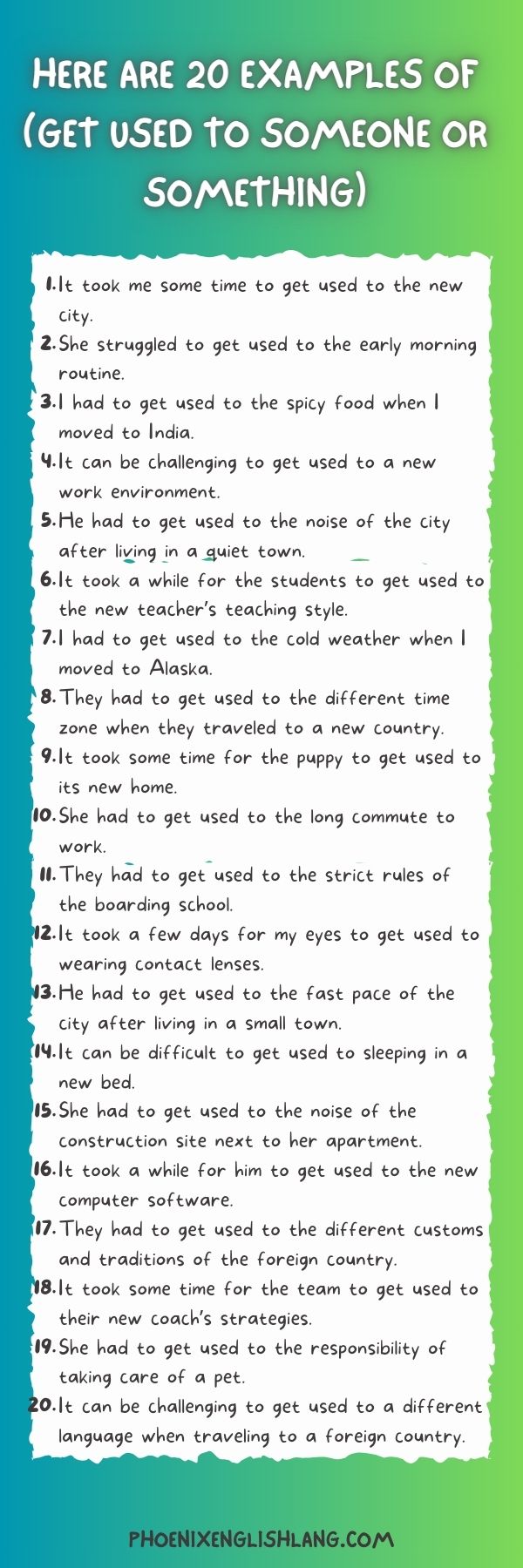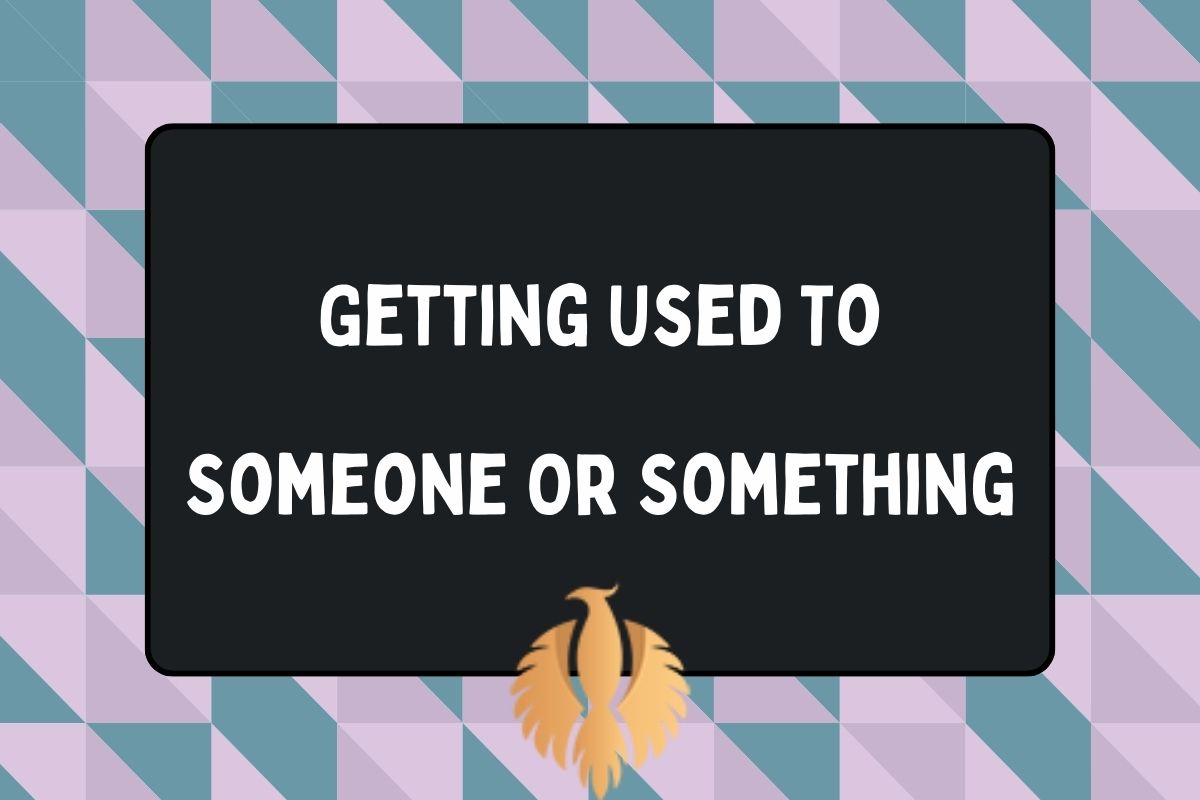Getting used to new situations, experiences, or environments is an inherent part of the human experience.
It involves a process of adaptation, a mental and emotional shift that allows individuals to become familiar with and comfortable in unfamiliar circumstances.
One of the fundamental aspects of getting used to something is overcoming the initial discomfort associated with change. Whether it’s a new job, a different city, or a fresh set of responsibilities, the unknown can be daunting.
However, as humans, we possess a remarkable capacity for resilience and adaptability. Over time, the unfamiliar becomes the familiar through a gradual acclimatization process.
Getting used to something often involves a blend of patience and openness. It requires a willingness to embrace new perspectives, learn from experiences, and let go of preconceived notions.
This adaptability is not just about external circumstances but also extends to our own evolving identities. As we navigate life, we encounter various phases, each demanding a certain level of adjustment and acceptance.
Furthermore, the process of getting used to things is intertwined with personal growth. Stepping out of one’s comfort zone, whether by choice or necessity, is a catalyst for self-discovery.
It encourages the development of new skills, the cultivation of resilience, and the expansion of one’s mental and emotional capacities. Each instance of adaptation contributes to a richer, more nuanced understanding of oneself and the world.
In a broader societal context, the ability to get used to change is a cornerstone of progress and innovation.
Societies that embrace adaptation are better equipped to address challenges, harness opportunities, and evolve in dynamic environments. Embracing change collectively fosters resilience and fortifies communities against the uncertainties of an ever-changing world.
It’s important to acknowledge that the process of getting used to something is not always linear. It involves peaks and valleys, moments of discomfort, and instances of profound insight. However, it is within this ebb and flow that individuals and societies find their rhythm and equilibrium.
You might also enjoy: Percent Sign Before Or After [2024 Guide]
How to Use Get Used To

“Get used to” is a phrasal verb that is used to describe the process of becoming familiar with something or someone, especially when it may be new, different, or initially uncomfortable. Here’s how to use “get used to” in a sentence:
- First, let’s start with the basic structure of the phrase:
– “Get used to” is typically followed by a noun or a gerund (the -ing form of a verb).
- Examples of sentences using “get used to”:
– “It took me some time to get used to the new work schedule.”
– “She’s still trying to get used to living in a new city.”
– “I had to get used to waking up early when I started my new job.”
- Remember that “get used to” indicates the process of becoming accustomed to something over time. It implies that something was initially unfamiliar or uncomfortable, but with time and experience, it becomes more familiar and comfortable.
I hope this helps you understand how to use “get used to” in sentences!
Here are 20 Examples of (get used to someone or something)

- It took me some time to get used to the new city.
- She struggled to get used to the early morning routine.
- I had to get used to the spicy food when I moved to India.
- It can be challenging to get used to a new work environment.
- He had to get used to the noise of the city after living in a quiet town.
- It took a while for the students to get used to the new teacher’s teaching style.
- I had to get used to the cold weather when I moved to Alaska.
- They had to get used to the different time zone when they traveled to a new country.
- It took some time for the puppy to get used to its new home.
- She had to get used to the long commute to work.
- They had to get used to the strict rules of the boarding school.
- It took a few days for my eyes to get used to wearing contact lenses.
- He had to get used to the fast pace of the city after living in a small town.
- It can be difficult to get used to sleeping in a new bed.
- She had to get used to the noise of the construction site next to her apartment.
- It took a while for him to get used to the new computer software.
- They had to get used to the different customs and traditions of the foreign country.
- It took some time for the team to get used to their new coach’s strategies.
- She had to get used to the responsibility of taking care of a pet.
- It can be challenging to get used to a different language when traveling to a foreign country.
You might also enjoy: Top 25 most used words with suffix less
What is the meaning of getting used to?
“Getting used to” means becoming familiar or accustomed to something over time. It implies adapting to a new situation, habit, or experience until it becomes more comfortable or routine.
The phrase “getting used to” refers to the process of becoming accustomed to or familiar with something new or different. It involves adapting to a change in circumstances, environment, routine, or mindset.
When we are getting used to something, we are actively working towards accepting and integrating the new element into our lives.
It may involve overcoming initial discomfort, resistance, or unfamiliarity and gradually becoming more comfortable and proficient with the new situation. The process of getting used to requires time, patience, and open-mindedness to adapt and adjust to the change effectively.
What is the meaning of takes some getting used to?
The phrase “takes some getting used to” means that adapting to or becoming familiar with something might require time and effort.
It suggests that the initial experience might feel unfamiliar or challenging, but with time and practice, it becomes more comfortable.
The phrase “takes some getting used to” means that something requires an adjustment period or a period of time to become familiar with or comfortable with.
It implies that the initial experience or encounter with something may be challenging, unfamiliar, or uncomfortable, but with time and practice, it becomes easier and more natural.
It suggests that there is a learning curve or a period of adaptation before one can fully embrace or feel at ease with the new situation or experience.
How is “get used to” different from just “used to”?
“Get used to” and “used to” have different meanings and are used in different contexts.
“Get used to” is a phrasal verb that refers to the process of becoming familiar with something new or unfamiliar.
It denotes the act of adapting to a new situation or experience over time. It is often used to describe the process of getting accustomed to something that initially feels strange or uncomfortable.
For example:
– “It took me a while to get used to the new job.”
– “She’s trying to get used to living in a different country.”
On the other hand, “used to” is a phrase that is used to talk about past habits or states that are no longer true. It indicates that something was a regular or habitual occurrence in the past but is not anymore.
For example:
– “I used to play the piano when I was younger.”
– “He used to live in Paris before moving to London.”
Therefore,”get used to” is about becoming accustomed to something new, while “used to” refers to past habits or states that have changed.
You might also enjoy: Themself Or Themselves: Differences + Examples + Usage [2024]
What is an examples of getting used to?

An example of “getting used to” something could be adjusting to a new work schedule, where initially the timing might feel unfamiliar, but over time, you become accustomed to it.
One example of getting used to is adjusting to a new job or workplace. When starting a new job, everything may feel unfamiliar and overwhelming at first.
You have to learn new processes, meet new colleagues, and adapt to a different work environment. It can be a challenging transition, but as time passes and you gain more experience, you begin to understand the expectations and routines of your job.
Eventually, you start feeling comfortable and confident in your role, and the new workplace becomes familiar. This process of getting used to the job and workplace is an example of adapting to change and becoming acclimated to a new situation.
Getting used to synonyms
Synonyms for “getting used to” include:
| 1. Adapting |
| 2. Adjusting |
| 3. Familiarizing |
| 4. Acclimating |
| 5. Habituation |
| 6. Getting accustomed to |
| 7. Assimilating |
Word for getting used to something bad
A word for getting used to something bad is “habituation.” It implies becoming accustomed to or desensitized to negative or undesirable situations over time.
You might also enjoy: Has Ran or Has Run: My 2024 + Examples
History about getting used to
Adapting to new circumstances and environments has been a constant in human history. From early nomadic societies to the Industrial Revolution, the ability to get used to change has shaped our progress and resilience. Societal shifts, technological advancements, and cultural evolution all contribute to our ongoing history of adaptation.
What is the meaning of takes some getting used to?

“Takes some getting used to” means that something requires time and experience to become familiar or comfortable with. It implies an initial difficulty or unfamiliarity that diminishes with continued exposure or practice.
What is a word for not getting used?
The term “unaccustomed” can be used to describe something that is not getting used to, indicating a lack of familiarity or experience.
Examples for getting used to
- **New Job:** Starting a new job can be challenging, but over time, you’ll get used to the company culture and your responsibilities.
- **Living Abroad:** Moving to a foreign country may feel overwhelming initially, but as you adapt to the local customs and language, it gets easier.
- **New Technology:** When introduced to a new smartphone or software, it might be confusing at first, but with practice, you’ll get used to its features and functions.
- **Exercise Routine:** Starting a new workout routine can be tough, but your body eventually gets used to the movements, and it becomes a more comfortable part of your routine.
- **Changes in Diet:** Adopting a healthier diet may be challenging initially, but your taste buds can get used to new flavors, making healthier choices more enjoyable over time.

Hi, welcome to my blog! My name is Omid and I am thrilled to have you here! I am an English language teacher with 12 years of experience and hold multiple international certifications (TESOL, IELTS, TOEFL, PTE, CELTA). Additionally, I hold a PhD in Applied Linguistics with a specialization in Teaching English as a Second Language (TESL), which fuels my passion for teaching English and assisting others in mastering the language. To me, nothing is more rewarding than helping individuals enhance their English language abilities through various methods. So, let’s embark on this journey of learning English together.




